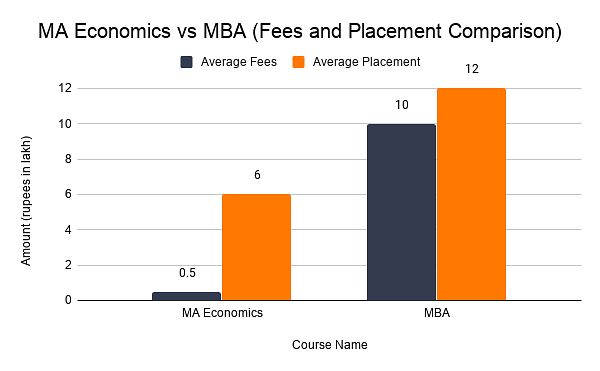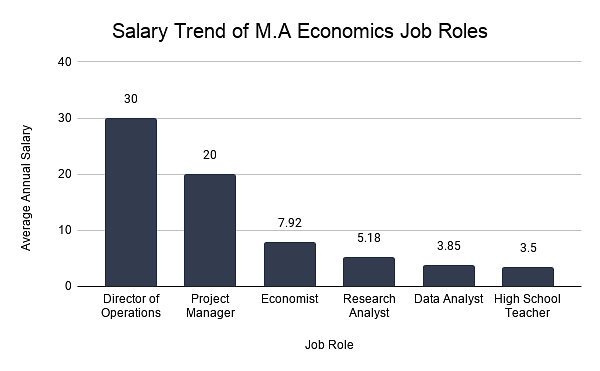MA Economics or Master of Arts in Economics is a 2 years long postgraduation course that is divided into 4 semesters. With a blend of all the aspects of economics in society, MA Economics broadly and commonly focuses on topics like macroeconomics, microeconomics, public economics, econometry, international and financial economics.
Economics deals with production and consumption and supply and demand changes in the markets. To be eligible to pursue this course, one needs to hold a bachelor degree in economics or in a related field with a minimum of 50%. The average annual MA Economics fees may range from INR 10,000-50,000, depending majorly on the college. Read More: Top MA Entrance Exams in India
After completing this course, one can proceed further with a PhD in Economics as it not only becomes a lot easier post qualifying this course, but also gives a good career opportunity. MA graduates in this field can expect their annual salary to range from INR 3 to 7 LPA .Top recruiters like ICICI Bank, RBI, Citi Bank, Bank of India, Indian Institute of Technology, Accenture, HSBC etc.
Mentioned below are some of the major highlights of the course.
| Course Level | Postgraduate |
| Duration | 2 years |
| Examination type | Semester system |
| Eligibility | Bachelor’s degree in economics or in any discipline from a recognized university |
| Admission Process | Merit-based and entrance exams |
| Top Recruiters | ICICI Bank, RBI, Citi Bank, Kotak, etc. |
| Job Profiles | Professional Economist, Data Analyst, Equity Analyst, Financial Planner, Professional Economist, etc. |
| Course Fees | INR 10,000 to INR 50,000 |
| Average Starting Salary | INR 5-7 Lakhs |
MA Economics: What is it about?
Dealing with the understandings of finance and market managements, MA Economics syllabus revolves around the world’s economy and the distractions of the financial markets. It not only shows the functioning of finance in an economy but also makes one eligible to face challenges in the industry.
- MA Economics is the study of wealth production, distribution and consumption in a society.
- The course covers a huge part of macroeconomics in terms of price, output, employment etc. and microeconomics dealing with demands, supplies, markets, consumer behavior and with related topics in an economy.
- Every aspect of a country starting from individuals, businesses to government, and services depends on economics.
- The degree holders may find themselves being placed in either government or private sectors of banking, finance and labor markets.
Why pursue MA Economics?
Studying this course can be interesting and fruitful at the same time. Look into the points below to know how.
- MA Economics gives a good hold of the subject to the students as it teaches the value of increasing demands and limited means to fulfill the growing needs.
- Pursuing MA Economics can get you a good scope of high paid jobs than other bachelor degrees. Banking, academic and organizational, government, and investment sectors are good career options for these degree holders.
- Being qualified also opens the doors for pursuing PhD in the same field of study.
- Economists are considered very important, as they are responsible in identifying the on-going structural changes in the market as well as dealing with the stability and national security of an economy.
- This course can also be a perfect choice to get one-step closer to qualifying the Indian Economic Services.
MA Economics Admission Process
Admission in universities like Delhi University, Jawaharlal Nehru University, Manipal University and many others is done through entrance exams, but there are colleges like Christ University, Loyola College, University of Hyderabad and some more that rely on merit-based admission.
Different patterns of admission are followed by universities like IGNOU and Karnataka State Open University as they provide distance education by direct admission. However, certain Colleges like Delhi University and Department of Business Economic reserve a percentage of seats for merit-based admissions.
Learn More about MA Economics IGNOU Admission 2024
MA Economics Eligibility
The eligibility standards are different for admissions through entrance exams and merit basis, but students eager to pursue their masters in economics must fulfill the mentioned-below MA Economics eligibility criteria.
- A bachelor degree in economics or in a relevant field of study.
- A minimum percentage of 50% at the level of graduation is required.
MA Economics Entrance Exams
Compiled below is the list of few popular MA Economics exams that are conducted by various colleges in India every year.
| Exam name | Registration date (Tentative) | Exam date (Tentative) |
|---|---|---|
| PUBDET | To be Announced | To be Announced |
| APU UG NET | To be Announced | To be Announced |
| TS EAMCET | To be Announced | July 2024 |
How to Prepare for MA Economics Entrance Exams?
An individual willing to sit for entrance exams in order to study MA Economics must have a vivid knowledge of the common sections given in the tests. Given below are some of the sections on which students must start focusing to get themselves a reputed college.
- Microeconomics
- Macroeconomics
- Basis Mathematics
- Economical Mathematics
- Probability, Statistics and Elementary Econometrics
Successfully qualifying an entrance test can seem as one of the scariest things but at the same time, it is one of the most important tasks to accomplish in taking you a step forward towards your dream college. Following the tips given below, one may find clearing an entrance exam easy.
- Note down the syllabus and start preparing study materials of each and every subject.
- Start collecting previous years' questions and sample papers for getting more knowledge on the patterns of the questions.
- Make a proper timetable and revise accordingly as well as thoroughly.
- Surf through relevant websites and books to clear basic doubts.
- Keep on practicing, taking help of different question banks until you become confident and perfect.
- Continuous follow-up with the changing dates and updates of the exam is necessary.
-
Make sure to have a proper rest period regularly.
How to get admission in a good MA Economics College in India?
- In order to secure a seat in one of the good colleges of MA Economics, it is suggested to have more than 55% in the undergraduate level of degree.
- Listing all the top colleges for the subject has to be done and keeping a track of important dates related to application and exams are to be noted.
- Candidates must start taking preparations for the entrance exams a year before.
MA Economics Syllabus
The syllabus for MA Economics can vary depending on the colleges and the universities, but down here is the syllabus that is commonly followed.
| Semester 1 | Semester 2 |
|---|---|
| Microeconomic Theory | Macroeconomic Theory |
| Introductory Mathematical Economics | Theory of Pricing and Distribution |
| Introductory Econometrics | International Finance |
| International Trade | Quantitative Methods |
| Semester 3 | Semester 4 |
| Development Economics | Public Economics |
| International Economics | Econometrics-2 |
| Econometrics-1 | Project Work |
| Industrial Economics (Electives) | Financial Economics (Electives) |
| Environmental Economics (Electives) | Economics of Infrastructure (Electives) |
| Globalization and Economics (Electives) | Economic Demography (Electives) |
| - | Economics and Law (Electives) |
MA Economics Books
MA Economics Books help students clear the exams and make the education a smooth process. There are a lot of such book available in the market and we have made a list of the some of the best ones for you. Following are the popular books one can refer to when pursuing MA Economics.
| Economics Books | Author |
|---|---|
| Indian Economy | Ramesh Singh |
| Delhi University M.A. Economics Entrance Test Guide | R. Gupta |
| A History of Economic Thought | S.Chand |
| Contemporary Economic Issues in India | P.K. Chaubey |
| Business Economics | Dr. J.P.Mishra |
| Micro Economics | P.N. Chopra |
| Essays on Economic Issues | Narasimha Murthy M.S. |
MA Economics Colleges
Tabulated below are some of top MA Economics colleges in India, along with the location, average fees and annual package offered.
| College Name | City | Annual Average Fee (INR) |
|---|---|---|
| Miranda House College | New Delhi | 19,030 |
| Presidency College | Chennai | 900 |
| Ramjas College | New Delhi | 14,300 |
| Fergusson College | Pune | 9,680 |
| Christ University | Bangalore | 60,000 |
| St. Mira’s College for Girls | Pune | 14,800 |
| Symbiosis College of Arts and Commerce | Pune | 26,000 |
| St. Xavier’s College | Jaipur | 62,500 |
| Kristu Jayanti College | Bangalore | 67,000 |
| Mithibai College of Arts | Mumbai | 11,300 |
College Comparison
Based on parameters like THE WEEK rankings, annual fees, annual packages offered and some more, here is the comparison of top colleges for MA Economics that one can discover to gain more clarity.
| Parameters | Lady Shri Ram College For Women | Miranda House College | Fergusson College |
|---|---|---|---|
| Overview | Ranking 5th among the colleges in Delhi in Arts and Social Sciences, Commerce and Journalism, Lady Shri Ram College For Women (LSR) has 150 faculty and more than 2000 students with 16 courses to offer. | Miranda House College, being affiliated under Delhi University, is a college for women, established in 1948. The college has NAAC A+ accreditation with CGPA 3.61. | Established by Deccan Education Society in 1885, Fergusson College is affiliated under Savitribai Phule Pune University (SPPU). |
| Location | New Delhi | New Delhi | Pune |
| Rankings ( THE WEEK) | 1 | 7 | 10 |
| Average Annual Fees | INR 17,976 | INR 19,030 | INR 9,680 |
| Average Annual Salary Offered | INR 8-9 LPA | INR 3-8 LPA | INR 2-5 LPA |
| Top companies visited | Deloitte, MSU, Citi Bank, KPMG, Samsung, PWC | IBM, ITC, Wipro, Kotak Mahindra Bank | Amazon, Infosys, Accenture, Symphony, Capgemini |
MA Economics Distance Learning
Students eager to know more about MA Economics in India must know that apart from a regular postgraduate degree, the course is also available in the form of a distance degree by the universities like IGNOU,Sri Venkateswara University, Karnataka State Open University, Punjab University, Bangalore University and Mumbai University.
- The admission criteria may differ as per variable universities on basis of either merit or entrance exams.
- MA Economics Distance Learning can take 2 years to 5 years for an individual to complete and the average annual course to study a distance program in the same course may cost from INR 9,000 to INR 12,000.
- To get placed in any government or a private organization will not be difficult for any aspirant of economics with a distance degree in the same field of study
- Distance Learning also gives ample opportunities to earn lucrative packages.
The table below shows some of the top MA Economics distance learning colleges in India.
| College Name | Location | Course Duration | Application Process | Average Annual Fee |
|---|---|---|---|---|
| IGNOU | New Delhi | 2 Years | Merit-Based | INR 4,500 |
| KSOU | Mysore | 2 Years | Merit-Based | INR 7,300 |
| Sri Venkateswara University | Tirupati | 2 Years | Merit-Based | INR 2,250 |
| Mumbai University | Mumbai | 2 Years | Merit-Based | INR 6,015 |
Course Comparison
Oftentimes, students tend to become confused in choosing between MA Economics and MBA for higher studies. The table drawn below will help you in understanding the basic difference between the two.
| Parameters | MA Economics | MBA |
|---|---|---|
| Objective | The main objective of MA Economics is to provide knowledge on all the aspects related to functioning of an economy. | MBA as a course revolves around the objective of covering all the topics related to Business Management. |
| Subjects Taught | Behaviour economics; banking and finance; labour market and reforms, etc. | Finance management; principles of management; communication skills; business laws; entrepreneurship, etc. |
| Average Annual Fees | INR 10,000 to 70,000 | INR 3 to 25 lakh |
| Duration | 2 years | 2 years |
| Eligibility | Undergraduate degree in any relevant field or the Entrance Exams | Undergraduate degree in any relevant field or Entrances like CAT, MAT, GMAT |
| Top Colleges | Lady Shri Ram College For Women (LSR), Miranda House, Fergusson College, Loyola College | IIM Ahmedabad, XLRI Jamshedpur, MDI Gurgaon, FMS New Delhi |
| Job Roles | Professional Economist, Data Analyst, Equity Analyst, Financial Planner, Professional Economist, etc. | Financial Manager, Health Service Manager, High-End Management Consultant, Investment Banker, Chief Technology Officer |
| Average Annual Salary | INR 5 to 7 LPA | INR 7 to 13 LPA |

Source: Official Surveys
MA Economics Job Prospects
Since this subject is closely associated with finance, markets and the functioning of an economy as a whole, professionals of MA Economics with a decent percentage have a huge scope of getting placed in both government and private organizations as economists.
Following are the various suitable MA Economics job profiles which degree holders can get.
| Job Role | Job Description | Average Annual Salary |
|---|---|---|
| Research Analyst | A research analyst does the work of examining data and producing helpful information to the employers. | INR 5,18,000 |
| Data Analyst | Conducting surveys, acquiring relevant information and presenting those collections into charts and graphs are what data analysts do. | INR 3,85,000 |
| High School Teacher | The job of a high school teacher is to make students familiar with all the aspects of economics mentioned in the curriculum off the board of education, and to conduct tests and project works. | INR 3,50,000 |
| Economist | Conducting and designing researches to identify trends as well to assist the government, banks and agencies are the day-to-day work of an economist. | INR 7,92,000 |
| Primary School Teacher | Primary school teaches economics as part of social science to the primary students. | INR 2,47,000 |
| Director of Operations | To ensure that all the individuals working in a firm are productive as well as to control purchases related to resources is the typical of a director of operations. | INR 30,00,000 |
| Project Manager | A project manager does all the jobs related to projects. Starting from developing a project plan, communicating the same to managing and arranging resources for the projects, everything has to be checked. | INR 20,00,000 |
MA Economics Top Recruiters
The top recruiters of MA Economics graduates from both private and public organizations are as follows:
| Government Organizations | Private Organizations |
|---|---|
| Rail India Technical and Economic Services | Infosys |
| Directorate of Economics and Statistics, Manipur | Zocdoc, Inc. |
| Department of Economic Affairs | Buhler India Pvt Ltd |
| Reserve Bank of India | Dell, Inc. |
| Indian Statistical Universities | Accenture |
| Central Bank of India | HSBC |
The graph below represents the salary trends of various job profiles. The average MA Economics salary is INR 5-7 lakh.

Source: Payscale
MA Economics Future Scope
Education is never ending, and if one has the potential and willingness to study further, then pursuing a Ph.D. in Economics or in another related research field may seem interesting. There are top universities like Indian Institutes of Technology (IITs), Loyola College, Indian Institutes of Management (IIMs) and many more offering a PhD in Economics.
The top specific courses to choose post MA Economics are listed below:
One can consider the above mentioned courses to continue with their further studies, in order to get an in-depth knowledge of specializations attached to the subject as well as of the subjects as whole. Studying further MA Economics is not only worthy in terms of gaining knowledge but it can also make an individual eligible enough to bag a high paid job.
MA Economics FAQs
Ques. Is MA in Economics tough?
Ques. Which are the best universities for MA in Economics?
Ques. Which Course is better, MBA or MA in Economics?
Ques. What is the basic difference between MA Economics and MSc Economics?
Ques. Is MA Economics worth studying?
Ques. What can be done after MA Economics?
Ques. How can one get MA Economics admission?
Ques. How many total subjects are there in MA Economics?


![Shri Ram College of Commerce - [SRCC]](https://image-static.collegedunia.com/public/college_data/images/appImage/4417_SRCC_New.jpg?h=150&w=320&mode=stretch)
![IIT Madras - Indian Institute of Technology - [IITM]](https://image-static.collegedunia.com/public/college_data/images/appImage/1509430807cover.jpg?h=150&w=320&mode=stretch)



![Chandigarh University - [CU]](https://image-static.collegedunia.com/public/college_data/images/appImage/1614949268bg.png?h=150&w=320&mode=stretch)

![Madras Christian College - [MCC]](https://image-static.collegedunia.com/public/college_data/images/appImage/2708_MCC.jpg?h=150&w=320&mode=stretch)

Comments